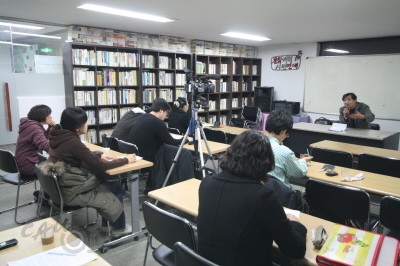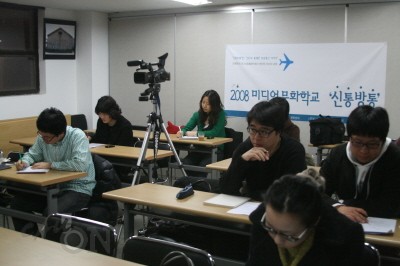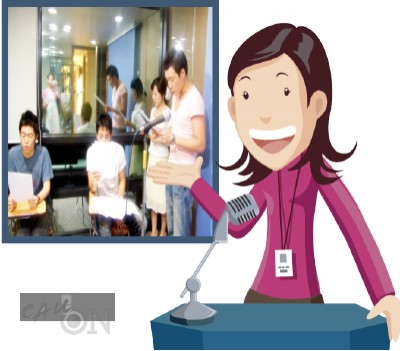
“What do you think about the relationship between raising the receiving fee and assuring the public of the character and quality of broadcasting?”
“Don’t you think these days’ newly recruited producers are quite ‘soft’, which means ‘rarely putting an edge on society’?"
“From now, what kind of programs do you want to make? You said you are still in a time of transition about progress and conservation or something.”
“I understand raising television broadcasting fees can be a solution for assuring the public character of broadcasting programs. However, it should be set forth beforehand that the broadcasting station must do their best when producing content for their media. In addition, these days’ the character of new recruits… well, I agree with your idea that they rarely put an edge on serious problems. I feel quite inconvenient about it. I even want to grow some enthusiastic young students with proper education. I also think the broadcasting station’s way of recruitment is not good. They mostly choose model students. And the next question is… my program plan? Actually, I always have many items in the works. I never worry about what will be a next content, haha. Specifically now, I’m ready to make some contents about food, water or oil problems.”
On the evening of February 14, at the lecture room of ‘Cultural Action (Mun-hwa-yeon-dae)’, people who are interested in media culture gathered. It was the 4th lecture of ‘2008 Media Culture School Shin-tong-bang-tong’. Cultural Action, the organization for cultural society, held the event. It prepared eight lectures; the Politics of the Media, Traffic and Culture (1/29), How Comic Books Portray History (1/31), A Friction Between Korean Dramas and American Dramas (2/12), Why and How PDs Make Media Contents (2/14), Choice, Emphasize and Exclusion of News (2/19), Yon-sa-ma, the Poison of Making Content (2/21), Watching the Real World On the Outside of Communication Regime (2/26), Rethinking Netizen Power (2/28). More information about this event is on its homepage, www.culturalaction.org. 
Today, many university students and young people are dreaming of becoming journalists, media culture experts. CAH conducted a simple research into them about these days’ media trend.
According to the research results, people prefer broadcasting or new mass media to traditional print media. In case of print media, main newspaper companies in Seoul got about 24% votes, but local ones were only 1%. In contrast to this result of print media, broadcasting and new media showed different explanations. Most of all main broadcasting stations got as many as 51% of the votes. Local broadcasting stations and Cable television stations were also around 20%, which was higher than those of local print media.
People who want to enter broadcasting or new media field generally thought the reason they prefer it is; print media is too strict and boring (27.7%). Even now it is said, ‘Do not to read newspaper but to see it’. In the same context, they voted this one as a second reason; the prospect of broadcasting is more bright (23.4%).
A journalist said in the book, 『The way to being a successful news reporter』written by Yoon Jae-hong, “Today, main news sources have changed from newspaper to broadcasting. Along with the change, people prefer ‘seeing or hearing’ to ‘reading’ when getting news. Especially, the quickness of broadcasting is right on with the rapid-changing times.” It might summarize the so-called ‘the general trend’ as a broadcasting media. Many people seem to have the same thoughts.
Changing the way of picking up news ‘from reading to seeing and hearing’ makes news providers busy, too. Newspaper companies in particular, have concentrated on developing various multimedia contents. Managing an online web site of newspaper’s reports is the most basic step; JOINS, Chosun.com, hankyung.com, etc.
There are more online services for ubiquitous readers. In JoongAng Ilbo’s ‘JoongAng Media Network (JMnet)’, we can get almost all fields of professional magazines and multimedia contents. JoongAng broadcasting channels (Q chaanel, history channel, Ch.joins, J golf, USA JoongAng) are remarkable. Recently, Joins TV has started a new formation of news program, ‘6 o’ clock, JoongAng News’ too. The editors of each desk are anchors of the News. They analyze and comment on the next day’s JoongAng Ilbo reports and found alternative plans too. Newspaper plus broadcasting news has shown new ideas for media culture.
The future journalists have also grown in a new environment. Many universities have changed major subject areas of the Department of Mass Communication to broadcasting, media studies, multimedia, public relations and film. Last year, Chung-Ang University admitted the first freshmen to its College of Media, Performing Arts, and Imaging Science, the successor of the Dept. of Mass Communication. To unite mass communication and performing arts is innovative. Ewha Women’s Univ., Yonsei Univ., and others have also changed their education focus of Mass communication. Those are all efforts to keep pace with a changing multimedia-leading age. Moreover, there are enthusiastic young men who will be the leaders of this new age.
Interview
‘KAA (Korea Announcer Academy) study club for announcer and TV reporter’ is…
KAA: We are preparing to be announcers and TV reporters. The study club is very important for preparing for the press exams. We can study and discuss with friends who have the same dreams. It is so helpful. We divided the study into two parts, written and practical testing and doing some projects on purpose.
The attraction of your dream
KAA: Anyone who tasted the ‘the beauty of broadcasting’ can not forget its fascination. Some people started to study with recent announcer hot wind but most loves to speak, criticize the social problem and express themselves a lot. Of course, the social position and income are not minor. However, ‘to marry a man of rank’ is a gross misunderstanding to us.
The biggest advantage
KAA: It is nervous racking to stand in the examination room. (In case of announcers test, the first test is a News reading. One split the test script in two for nervousness.^^;) With the help of the study club members, the strain can diminish a lot. This test is too difficult to pass. Study club members are selected for the most suitable people to share in the sadness of failure. For better human networks, we make many events to share, such as drinking parties, membership training, etc.

KAA: The biggest difference between Newspaper Company and Broadcasting Stations is the way of communication by article or word. Many people today have no hesitation about expressing themselves. In their point of view, some announcers or TV reporters(anchors) are attracted by visual aspects and are considered quiet good. In addition, these day’s people avoid reading and understanding, and prefer the ocular spectrum of TV. However, ‘the word’ of announcers and TV reporters is never available unless they have their own firm beliefs and opinions. Some people prepare for the test to become ‘famous’ but think about it. How many announcers do you know among the more than 150 announcers? Those that become famous among them are only 1%.A

